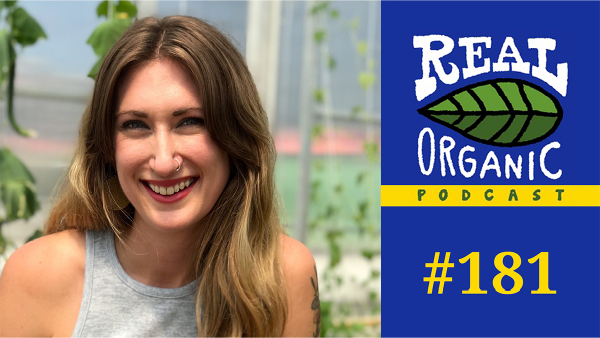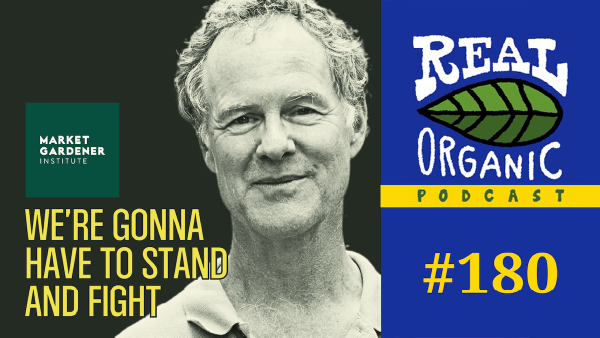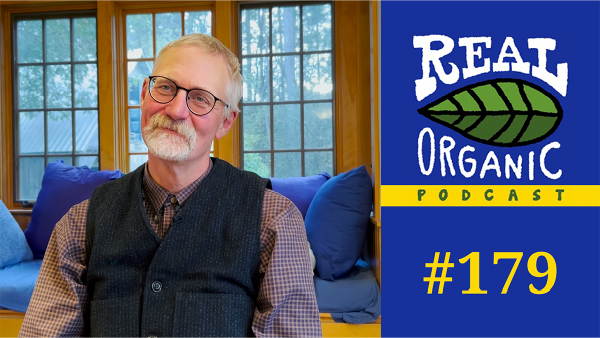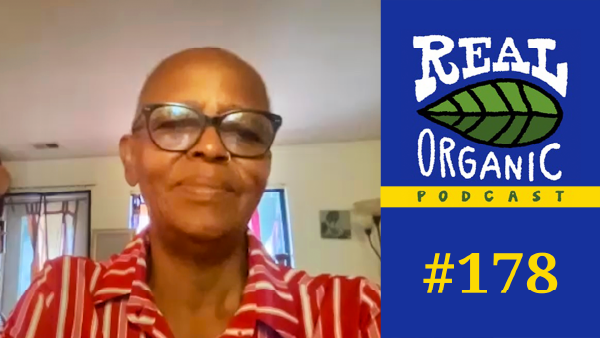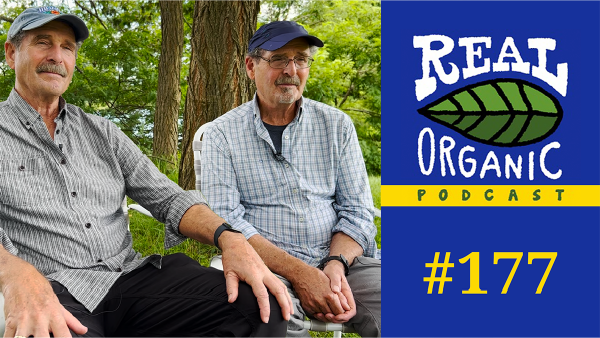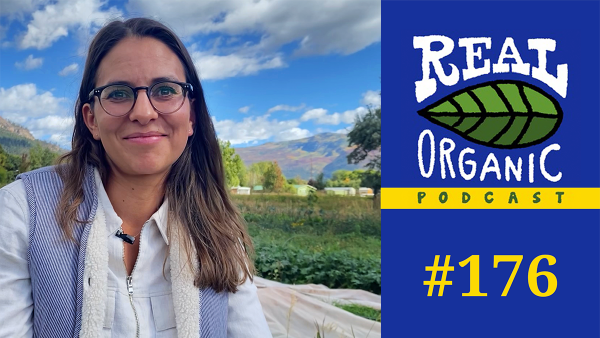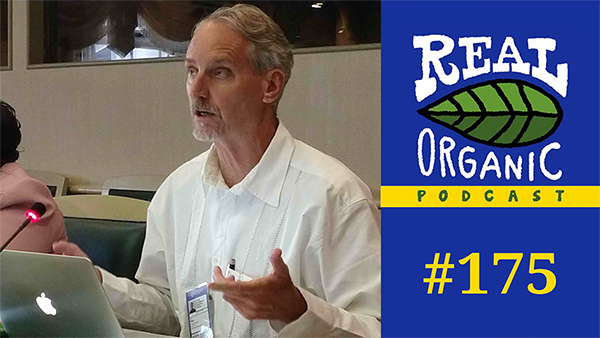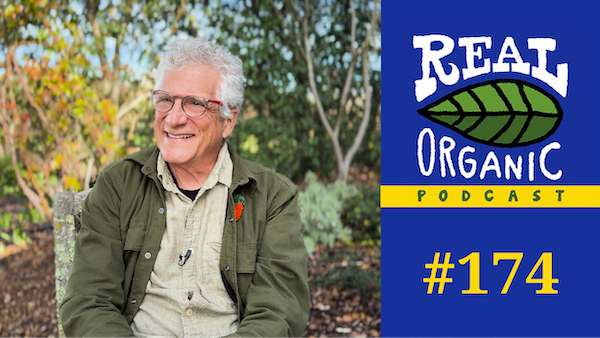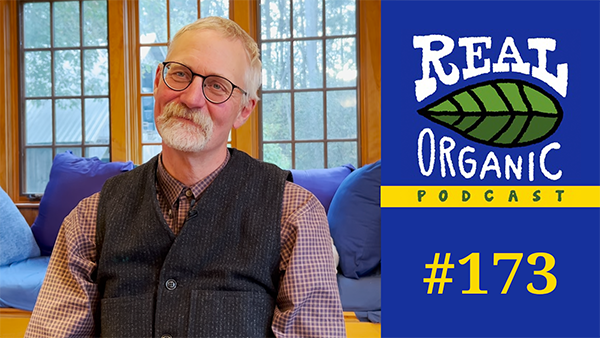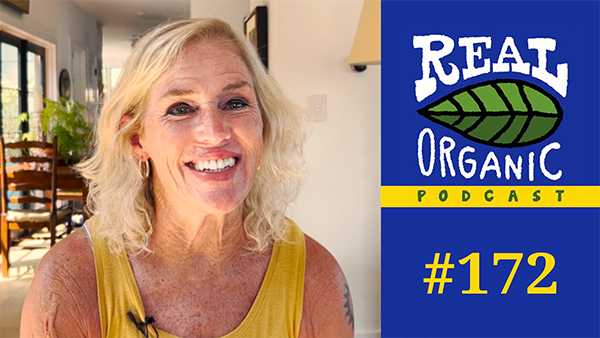Episode #161
Dave Chapman + Anna Jones-Crabtree: Notes For The Climate Underground
Welcome! You can subscribe and download episodes of our show through your favorite podcast app.
You can also subscribe to receive the video version of each episode on our YouTube channel.
Our Anna Jones-Crabtree and Dave Chapman interview is published here with permission from the Climate Underground team.
Al Gore interviews Dave Chapman and Anna Jones-Crabtree:
Al Gore 0:21
Welcome back. Our next conversation gets at the heart of what we need to make agriculture more sustainable, a transition away from conventional approaches, and a transition that operates at scale. We’ve heard from Secretary Vilsack on the pro regenerative agriculture policies that he is supporting at the USDA. But as you know, this is a grassroots farmer led movement. So it’s apt that we’ll hear now from two farmers who are great advocates for regenerative agriculture through their own work. First, I’d like to introduce Anna Jones-Crabtree of Vilicus farms. Anna is an organic farmer in Montana, at Vilicus farms, she also leads a farmer apprenticeship program on the northern Great Plains.
Al Gore 1:13
And joining her is Dave Chapman, the co-director of the Real Organic Project and a pioneer in maintaining the integrity of the organic label. I’m so honored to have both of you here with us today for this important discussion. Thank you so much. Anna, to begin with, I’m hoping you can help us understand what I consider to be one of the most important topics at this conference. And that is how farmers can make the transition from conventional to regenerative agriculture. Change is always difficult, and changing farming practices can be particularly difficult for many reasons, not only economic, but also cultural and familial. And so please share with us your story of how you made the transition, and the broader lessons, you think we can learn about how to support other farmers starting to make this transition?
Anna Jones-Crabtree 2:13
Yeah, certainly, it’s an honor to be here and having this conversation with you both. Doug and I started our farm in 2009 from scratch, and we knew that we were going to be organic from day one. So we’ve been now managing 12,500 acres, and much of that we have transitioned from a chem-fallow, no-till conventional system into organic. As you alluded to, there’s so many facets to supporting farmers in shifting systems. What Doug and I believe is, is it’s not necessarily a shift in practices, it has to be a shift in mindset, you have to think differently about your farm as a whole system, not a checklist of practices. There’s a lot of other policy work that I think we can be doing to help support farmers in the transition because we’re really stuck in a larger support structure system around farmers that isn’t leading us to diversity and biological solutions. So that’s the short, I could go on for many, many more words, but that’s the short.
Al Gore 3:30
Well, we’ll come back to you. Let me turn to Dave, now. Dave, another crucial topic that has significant policy and market implications is the issue of certifications and I know you’ve been deeply involved in that. This really speaks to the importance of defining what we mean by regenerative agriculture. So the label doesn’t get taken away with big corporate interests, redefining it to their liking and profit. And also the organic certification, an area where you spend a lot of your efforts. Could you walk us through the certification issue, from your point of view and explain why you believe it’s so important for the future of organic and regenerative agriculture?
Dave Chapman 4:16
Sure, Al. I believe that there are millions and millions of people who want what you and I want, and what Anna wants, which is that we want to see an agriculture that we can say that is Real Organic, we could say that it is real regenerative. I think in their essence, those two terms would be the same. And that we want to see livestock that is raised on pasture and chickens that are out, you know, in the grass every day and we want to see vegetables grown in really healthy soil. So the question is, how do we connect this community of people who want to eat that food, and there are millions, with their community of farmers who want to grow that food and make a living? And if we can connect those two, then we start to get a virtuous circle where everything gets better and better.
Dave Chapman 5:02
And I saw that circle starting to happen in Vermont about 2016, where the organic market for milk had become attractive enough, the price point was good enough that I thought all of Vermont dairy might go organic. And Vermont dairy is a bunch of small scale dairy farms. And they were looking in that they couldn’t really make a living competing against large confinement operations, except in the organic market. And we started to see a lot of farmers transitioning. This was capitalism working in its ideal sense, as we would like to see capitalism working, in a free market economy, people making informed choices, protected by the government, protected by the USDA, saying this is the organic certification, it was working. And most of those farms, people are not transitioning to organic in Vermont anymore, simply because they can’t make a living. And they can’t make a living because your organic market has been flooded with confinement milk from the southwest, primarily. And it’s depressed the price and the whole thing is a little bit falling apart.
Dave Chapman 6:14
And the same thing, I believe that regenerative faces all the same challenges as a separate market as organic, but organic has one difference. It’s got a legal definition. It’s got a law, that’s a good law, the Organic Food Production Act. And if we can get enforcement of that law, legitimate enforcement, then the market will take care of the rest. I don’t mean that there aren’t other things that government can do. We would love to see more research in organic, we would love to see certification costs covered as they are in Denmark, entirely by the government. All these things would help people to transition. But the biggest thing is to have a marketplace with integrity and transparency, which we do not have right now.
Al Gore 7:03
How did those big confinement dairy operations qualify as organic? What happened to change the definition to bring them in to the same category as the small dairy farmers in Vermont that you’re familiar with?
Dave Chapman 7:18
I would say it was a lot of lawyers. I don’t think that they do qualify, but they have been successful at getting through the process, finding certifiers who are willing to certify them. I know recently, the USDA actually decertified the Texas Department of Agriculture, saying you are not being legitimate in your work. And that’s been contested in the courts, and it hasn’t played out yet. So Texas had six huge confinement operations that were certified as organic. And those six operations were producing the same, if not more mill, than all of the family farms, the 450 farms in Wisconsin that were certified as organic, six farms.
Dave Chapman 8:10
And the question is, are those farms organic? And by whose definition? And I don’t think they were organic, I don’t think they would be called regenerative by any stretch of the imagination. But this is the challenge of regulatory work. And this is what, you know, we seek to try and have the government do a better job. And you know, you famously once said, It’s really good to change the light bulbs, but it’s more important to change the laws. And I’ll add to that, and then enforce the laws.
Al Gore 8:45
Yeah.
Dave Chapman 8:45
You know, if we can get a government that actually protects us in the way that we would hope. And I’ll say that this has been bipartisan in the destruction. So it’s about a lot of money influencing politics. But if we could get our government to actually do the task that, actually when you were vice president, the USDA was assigned to do which was transparency and integrity. Were there. The market will take care of it. And small farms will rise up and succeed. And we’ll see the whole food system change.
Al Gore 9:24
Yeah, and the large operations and large corporations have asymmetric and unequal access to the regulatory process and the enforcement process and a small dairy farmer in Vermont is not going to have a lobbyist in Washington or white shoe law firm pressing the case and you get these huge agribusiness companies that do. So they’re moving on. There are a lot of existing programs to support farmers that are often tilted now toward conventional forms of agriculture. And there are also many new programs underway, as a result of the Inflation Reduction Act, and I’d love to get each of your perspectives as farmers and as advocates, for how those programs should be implemented in a way that makes the programs accessible for small and medium size, regenerative or organic operations. And I’d like to start with with you, Anna.
Anna Jones-Crabtree 10:28
Yeah, certainly. It’s a really exciting time, the amount of resources that are moving in to thinking about soil and Climate Change solutions and the role that agriculture has to play in that. I might disagree a little bit with Dave, in that I think we often say if we just fix the market solution, we’re gonna fix everything else. And we haven’t taken into account, in our policies, that our economic system is something that we’ve created, it has arisen out of our social system, which arises out of our ecology. And there’s some basic facts around agriculture today, that I think if we actually stood back and said, if we could design a system that would work better for all of us, we’d do it really differently. Instead of this practice, by practice, let’s fund a practice approach, or let’s provide crop insurance for a certain crop. What we would do is we would think fundamentally differently about providing support to a farmer, a human being, versus a commodity.
Anna Jones-Crabtree 11:35
And I say that because Doug and I started our farm from scratch, and we’ve attempted to have apprentices on our farm thinking farming is like this most awesome alternative, especially organic, the opportunities are so great, to have a multifaceted vocation that you’re inside, you’re outside, you’re taking care of nature, you’re doing the right things for the planet. What we have found, is it’s really hard work. The risk structures between farming and everybody else are not equitable. And that leads us to less than 1% of our population is trying to make a living in production agriculture. So we can do a lot.
Anna Jones-Crabtree 12:18
And I’m not saying we shouldn’t, with supporting existing farmers to transition, I think we have to fundamentally think about what is the opportunity to bring so many more people into agriculture, and have them start in a way that is not based in getting land from their family? Couple other statistics I find really interesting is less than 1% of our agricultural land is organic. So in the state of Montana, we have 18 million acres of cropland, something like 50 million acres of range land, less than 1% of that is organic. So those of us that are actually on this leading edge of regenerative, we need to find some other ways to help support those farmers doing what they’re doing over the long run. You can’t build soil on quarterly profit reporting cycles. And you overlay the issues of climate. And Doug and I’ve been through it, we’ve had three years of horrendous drought. We had 9% of our average production last year.
Al Gore 13:25
Wow.
Anna Jones-Crabtree 13:26
Coming off of a year, we had 34%. We still did all the right stuff, right? We grazed cows, we have a seven year crop rotation, we grew twenty things, we paid people to do it. I worked an off farm job to have health insurance to support us. All that said, it gets back to the piece I started with, the market. If you don’t have something to produce, to sell on the market, it doesn’t matter what the market premium is. So we have so the piece that I guess I would suggest is let’s find a way to fundamentally share risks differently. With those of us that are in agriculture, that make it something that people want to flock to, they can see a living in it, they can see an opportunity. So I guess I would say yes to all the stuff that’s happening with the IRA money, keep going. But what would happen if we had some basic farmer income? For those of us that started in agriculture?
Al Gore 14:29
Yeah, got it. Dave would love to hear your thoughts.
Dave Chapman 14:32
Well, I agree with a lot of what Anna said, of course. I see the 300 million that’s been set aside for helping transition marketing for organic. And there’s a wonderful program in California called ALBA. And they’re training people who have come from the families of farmworkers and are farm workers themselves, you know mostly Hispanic families. And they’re training them to be organic vegetable farmers, so that they can have their own farms. And it’s a beautiful program, and it’s well done, but most of the graduates get out, and it’s not so good when they get there. So I think transition without creating a viable marketplace is not going to work. It’s putting the cart before the horse. So I agree that just throwing money at it is not going to get us there.
Dave Chapman 15:35
Another problem with it with the money, is an awful lot of it is going to, I think, the very companies that created the problems in the first place. And I’m not confident about that. So I do believe that if we can, if we can address the marketplace, but by that I don’t just mean encourage more purchasing of organic, although that’s very important. And we see from the EU tremendous government impact based on that support. But I really think it’s that integrity in the marketplace. So when people make a choice, and I know we’re talking a lot about regenerative, there’s going to be tremendous greenwashing going on there. They’re going to be many, many labels claiming regenerative, and they’re all gonna have different definitions. There’s money flowing there, because there’s a lot of public interest because people care about climate very much. And they want to go and come up with a solution.
Dave Chapman 16:34
I’m reminded a little bit of what happened at Rio in the Earth Summit, where the industry had made a mistake by attacking Rachel Carson, and saying, you know, we’re gonna stop this woman who’s attacking us, and they failed, and she became a national hero. And so in Rio, they took a different perspective. And they said, we agree with you, we get it, there’s a big problem here, we understand it. Actually did understand it, they knew about it before everyone else. We want a seat at the table. We want industry to create voluntary standards. And they set back the climate movement by a generation, because all of these big players came and took a seat at the table, but they actually weren’t trying to change things. They’re trying to put off change. So I think it’s very important when we throw a lot of money at something that we call regenerative and there’s fantastic regenerative, and then there’s stuff that isn’t so fantastic that we really be discerning and figuring out what is it that we want to see change? And how do we create that change?
Al Gore 17:40
Yeah, I was at Rio, and the fossil fuel industry has steadily gained evermore influence inside the annual conferences of the parties to the point where, so I’m sure you’re aware this year they were able to get appointed as President of COP28, the CEO of one of the largest, and by many accounts, least responsible oil and gas companies in the world, it’s really absurd. And it was all based on the premise, They know about energy. So let’s have them at the table, so they can help lead the way. Well, they’re not leading the way they’re trying to slow it down in every possible way. They lied to the public around the world for years, and I’m going to stop on this, I press my own button. And you you bear some responsibility for that triggering me on it. But you’re exactly right.
Al Gore 18:39
But let’s move on. I want to make sure that we address the issue of supporting farmers in a comprehensive manner. And you talked, Anna, about focusing on the individual farmer. I’m curious if either of you would identify any other challenges that need to be addressed or fresh solutions that might be available to help regenerative and organic farmers. Dave, I’ll start with you this time and then go to you Anna.
Dave Chapman 19:10
I think that obviously, we need to spend more money on research. If organic is 7% of the marketplace, I believe. And we’re getting, I think, far less than 1% of the research dollars. So that would be a huge place to immediately address. One of the things that I think has been very good out of the $3 billion or so that has been put towards Climate Smart Agriculture is that it was always tied in with money towards BIPOC farming community. And that’s a positive thing, and I think it’s going to have positive outcomes. But again, if we don’t create the marketplace for when they get there, we’re still not solving a problem. And I think you know Anna has a lot I’d have ideas about maybe how to do that, I have the idea, we’ve been working on at Real Organic, which is to try and create a marriage with the people who want to buy that food.
Dave Chapman 20:11
And I’ve been accused of preaching to the choir. But I say it’s a very large choir, there are millions and millions of people who want this, they just can’t necessarily find it or trust it. And if we looked at the EU, interesting thing, so the EU organic sales are just about neck and neck with the US, they’re about a billion dollars ahead of us. And they’re growing much faster. And they’ve done that without compromising on confinement livestock or hydroponic certified as organic. And so you can see that you don’t have to cater to just saying, well, we got to make it cheaper and cheaper and cheaper, so that people will come into organic, they haven’t done that, and people are still coming. They’re flocking to organic. And it’s a big market, it’s a big world market, there’s about 2 million organic farmers in the world, this is happening. And the whole world is looking to the US to do a better job.
Al Gore 21:18
Yeah.
Dave Chapman 21:19
You know, we don’t control the world market, but we’re a big player. And so I feel that we have a responsibility to do better. And that’s what we’re trying to do.
Al Gore 21:30
Great, Anna, I’d like to have your thoughts, and close us out here.
Anna Jones-Crabtree 21:36
Okay, well, I think it all comes down to relationships. So you know, Doug and I are also Real Organic certified, were Bee Better certified by Xerces Society. It’s got 400 acres of native habitat for pollinators on our farm, and we’re doing a lot more. So what the regenerative/organic movement ask of farmers is for us to have fundamentally a relationship with our land, with our soil, with the ecology that’s there. That’s a given and a take. The challenge that we have is that relationship of reciprocity where we might graze cows one year and not take a seed cover crops, so we’re giving something back to the soil. We grow lentils that put nitrogen down into the soil that feeds the next crop of wheat.
Al Gore 22:27
You’re part of the Lentil Underground?
Anna Jones-Crabtree 22:29
We totally are.
Al Gore 22:30
Well, the Lentil Underground and the Climate Underground are now connected.
Anna Jones-Crabtree 22:34
They are very similar. I’m really excited about future underground partnerships there. But that relationship building, that’s core, and what happens when you turn and you send things off your farm, through the farm gate to the rest of the marketplace. We’re not asking for fundamental change in the rest of the supply chain. So I think we have to think really differently about risk sharing. Are there longer term contracts that buffer farmers income against climate and instability? Are there ways that we can help farmers bond together so that there’s a geographic dispersion? So if you’re growing lentils, there’s always lentils to sell to this company that sitting at the table with you? I think it comes down to relationships. And that means, in terms of policy, we have to change the rules of engagement around some of these things. Yeah, so I don’t know if that’s a good close up.
Al Gore 23:37
Yeah, no, absolutely. Before we close out this session, I do want to return to how this label is applied, organic, particularly. And we’re, you know, we’re at the beginning of the journey on the regenerative label. But I’m interested from both of you, because I’ve heard from my friend Will Harris down in Georgia, where the price premium for organic food, which is preferred by enough people that the premium has emerged, when that’s eroded by operations that get themselves labeled organic when really, most people would say about some of them, no that’s not really the deal.
Al Gore 24:33
Dave, you said earlier, you know, this needs to be changed and the enforcement of it needs to be changed. Do you have any ideas on how we can be more effective? I speak for all of us at Candy Fork Farms here. We’re definitely on the same side of this argument that you are. And I’m interested from both of you and I’ll start with you Dave, because you’ve worked so hard on this, and then Anna, you’ve dealt with this a lot as well. Are there any new ideas on how we could be more effective in really focusing the definition on the farms that really made the principles that ought to be first and foremost, and people’s minds when they read the word organic, read the label organic?
Dave Chapman 25:20
Well, Al we created the Real Organic Project to create that label. But honestly, it’s more than just trying to create a brand. And it’s trying to create education. Because these issues are complicated, and people need a fair amount of conversation to really get it. One of the things that I’ve come to learn, I didn’t start this place, but I’ve really come to see that perhaps most of these problems are created by an extreme concentration of capital and power in a few hands. And you end up with, I think, outcomes that are bad for all of us. So I would like to see the laws enforced around antitrust. And you know, end people having too much influence on any market. And I think that’s true for, you know, production farms. It’s true for distribution. It’s true for processing, and it’s true for retail, and anytime we get too much concentration, I think we lose our choices. And when we lose our choices, we lose the ability to create the world we want to create.
Al Gore 26:29
Yeah, there are efficiencies in size, but oligopolies often are associated with abuses and oligopsonys, the concentration of a small group of buyers, often leads to the same abuses that’s another front in this struggle. Anna, what about your ideas on this?
Anna Jones-Crabtree 26:50
Yeah, so many variables to play with. So I love how Dave thinks really, really big. I have to think more at the scale of our farm and what’s going on on every acre that Doug and I have the amazing opportunity to steward. And this question of ongoing farmer income is so present for us after our last three years of drought. I mean, nobody had our back, right, we have crop insurance, but there is a significant gap between what we get for crop insurance versus our neighbors in a chemical fallow no-till system. You know, things like we could be paid to do intercropping by NRCS. And then on risk management agency, we’re told, under crop insurance, that is a prohibited farming practice. And you’re not covered.
Al Gore 27:45
That is a what?
Anna Jones-Crabtree 27:46
Prohibited practice.
Al Gore 27:48
Yeah, yeah, that’s crazy.
Anna Jones-Crabtree 27:49
Right? So okay, so all that said, it comes back to relationships for us? And how do we establish good relationships with every one of our buyers? That’s honest and transparent, and how we establish relationships with others that can support our farm, because every farm in a way, it’s a beating heart and every community, right? It provides flow of salary payments to people working on it, it provides flow of food, it takes care of clean air and clean water. So how do we support farms like that? In a way that’s not really reductionistic?
Anna Jones-Crabtree 28:25
So we’ve launched a CSSA program, which is Community Supported Stewardship, Agriculture. It’s a riff on the CSA program of where how do we have risk share of some of our buyers. So instead of trying to get ecosystem service payments, and reductionistic carbon payments, we’re actually engaging a suite of people, I think we have 70 or 80 now, that are paying for our stewardship service. So we have some basic income under it. So I think we have to think fundamentally different, some more creativity in terms of options and not allow ourselves to just be stuck in the system that’s not working for all of us.
Al Gore 29:06
Makes sense. Makes sense. Thank you. Thank you so much. And thank you both, I very much appreciated this conversation, and I have a feeling our Climate Underground attendees feel the very same way. Anna and Dave, your shared expertise is absolutely invaluable to us all. I’m excited to see what you all collectively do for the regenerative agriculture movement in this country. So thank you both so much for joining us today. We’re really, really grateful. And that wraps up our first day of programming for Climate Underground. I’m so grateful to all of our speakers today. It was a truly engaging set of conversations. I’m grateful to everyone who attended, and I’m particularly glad that all of you could join us today. Let me remind you that if you missed any of today’s conference programming, you can watch or rewatch on this website until the end of the day on Sunday.
Al Gore 30:06
We’ll be back tomorrow for more of the Climate Underground conference, we’ll talk about the burgeoning movement known as Food is Medicine. You know, the founder of Western medicine, Hippocrates famously said “Let food be thy medicine”. Well, there’s a lot packed into that phrase, and we’re going to explore it tomorrow. We’re going to discuss the need to embed justice in every part of our food systems. We’ll speak with Senator Debbie Stabenow on the progress of the Farm Bill, the ranking Democratic member of the Agriculture Committee, a longtime friend, longtime friend of the Climate Underground, as well. And we’re going to dig into how we can reward soil carbon sequestration. And we’ll end with a reflection on sustainable food systems with my co host, Chef Alice Waters, and it’s going to be great fun to hear Alice’s thoughts again this year. A lot has been going on, that she’s been responsible for. I’m looking forward to seeing you all back here for day two of the Climate Underground. Thank you very much for joining us. Have a nice evening. We’ll see you tomorrow.


